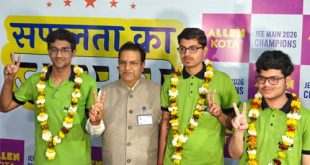Gandhian Dream’s: Human and Scientific development with Sustainability
Newswave@New Delhi
Mahatma Gandhi, the human rights barrister-turned freedom fighter is often been misquoted and mislabeled as anti-science and technology due to his concerns over human and environmental impacts of technology. When the world commemorates the 150 years of Gandhi, it is time to rethink and revisit our understanding of his that aspect of life and work. Gandhi was a keen experimenter, an enthusiastic inventor and assiduous innovator, who was continuously making, discarding and refining his daily used items such as sandals made from wheel tyres, methods for rural sanitization, his altogether famous cotton spinning wheels which later on became his trademark, to be named a few. Gandhi’s memorabilia is one of the major earners in Indian tourist shops. Gandhiji was also world’s early environmentalist in vision and practice. His famous quote “Earth has enough resources for our need but not for our greed” also shows his compassion towards the protection of nature and resources.

According to Dr Kumar Gautam, Founder and technological aggregator of Quantum Research and Centre of Excellence (QRACE), New Delhi, India, about Gandhian perception and act as an engineer by heart. His unique ideas and. It is said so due to the facts documented in history that Gandhi adopted experimental methods equally in planning and execution of civil disobedience campaign. Gandhiji’s concept of sustainability is more relevant today than in his own time.
Gandhi’s Technology
Gandhiji played a major part in translating his understanding of science into practice by the famous Khadi movement. Leading to the coinage of terms like “science of spinning “ and later on, “ Khadi science “. His speeches have records of extensive use of term science with Khadi among workers. He was a true follower of sanitization and cleanliness. His famous quote is, “Everyone must be his own scavenger “. He said, “ Cleanliness is more important than independence “. He in fact used media to create awareness about cleanliness. He favoured better technology for water outlet and clean Laboratorie for Indians living in South Africa He said: “I will not let anyone walk through my mind with their dirty feet”. It’s true that Gandhi said a lot against technology also, but he had his own reasons for that. He, in fact, was against the dehumanization aspect of machinery. He was worried about inequality that mechanization would create but was not entirely against technology. If computers have found a place as a mass product at that time, he would have pushed to make it cheaper simpler and functional for common man, rather than opposing it. As New York Times once quoted” This is computing looking as simple, if Gandhi has invented it”.

Gandhi and Sustainability Mahatma Gandhi implored people to live simply so that others may simply live. This is the concept of sustainable development which is widely accepted now says, Dr Indu Tripathi, Research Director, Energy and Nanotechnology, QRACE. However, his concerns were not limited to human beings alone as he had a very strong sense of the unity of all life. He believed that all creatures had the right to live as much as human beings and felt a living bond between humans and the rest of the animate world. He believed that humans should live in harmony with their surroundings He was for such a machine that could reach the masses making their lives better. His ideas and vision when implemented with technology, can bring a great change in today’s time. As honourable Prime Minister Modi at UN meet urged the world to imbibe Gandhi’s philosophy saying “As long as Gandhi continues to be a significant part of the humanity, his inspiration and relevance will also remain among us”.
 News Wave Waves of News
News Wave Waves of News








